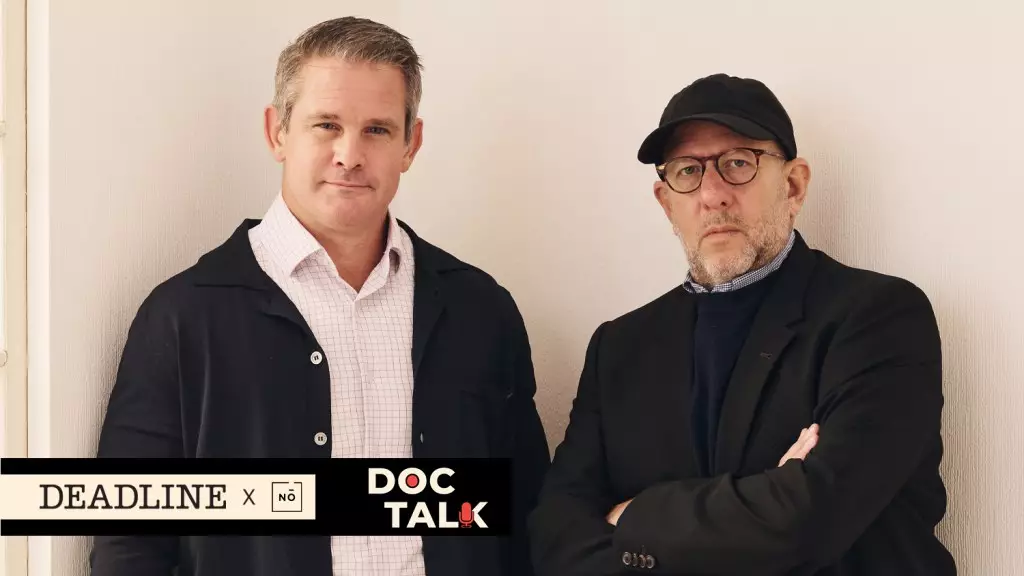In the tumultuous era of modern American politics, few narratives have captured attention as vividly as that of former Congressman Adam Kinzinger. Once heralded as a rising star within the Republican Party, Kinzinger’s trajectory drastically altered following the insurrection on January 6th, 2021. He gained notoriety for his willingness to stand against former President Donald Trump—a move that has earned him both accolades from Democrats and scorn from Republicans. This dichotomy reflects not only Kinzinger’s personal convictions but also highlights the intensifying polarization within U.S. politics.
During a recent captivating interview on Deadline’s Doc Talk podcast, Kinzinger opened up about the perilous consequences of his principled stance. Having joined the January 6th select committee aimed at scrutinizing Trump’s role in the Capitol riot, Kinzinger faced backlash that reached alarming levels. Death threats have permeated his life, endangering the safety of not only himself but also his wife and young child. Such instances reveal the dire atmosphere of intimidation that has become commonplace for those who dare to dissent within their own party.
While the public may celebrate Kinzinger’s resolve, the personal toll has been staggering. Reports indicate that he isn’t just fighting a political battle; he’s wrestling with the animosity directed at his family. Kinzinger disclosed that even his parents have faced abuse from individuals who are angered by his decision to speak out. This familial rift serves as a painful reminder of how deeply political beliefs can strain personal relationships.
The interview was conducted during the Toronto International Film Festival (TIFF), coinciding with the premiere of “The Last Republican,” directed by Steve Pink. This documentary offers an intimate look at Kinzinger’s evolution, weaving together his journey from a celebrated GOP figure to one branded as a pariah. This transformation underscores a critical question: at what point does loyalty to one’s principles outweigh loyalty to one’s party? For Kinzinger, the answer seems unequivocal, although the consequences are far-reaching.
Kinzinger revealed a lingering regret that adds depth to his narrative: his perceived failure to “lead our own coup in the Republican Party.” This admission encapsulates the struggle of a man caught at a crossroads, acknowledging that significant shifts within his party may have been possible if he and like-minded officials had taken a more assertive stance. The notion of leading a coup, while provocative, speaks to the desperate need for reform in a party increasingly dominated by extreme factions.
While Kinzinger grapples with his regrets, the political atmosphere around him is rapidly shifting. Conversations surrounding his narrative extend beyond his personal experience to frame the broader implications for the GOP as it navigates its relationship with former President Trump. This ongoing struggle raises concerns about the future of American democracy, particularly when adhering to democratic principles can carry such heavy personal costs.
The backdrop of TIFF, where Kinzinger’s interview took place, serves as a fitting setting for exploring these crucial themes. The festival opened doors to rich conversations with filmmakers tackling diverse subjects, from documenting the lives of iconic musicians to deep explorations of sociopolitical complexities. The diversity of voices represented—ranging from Nobel laureates to music producers—illustrates the power of documentary as a medium for reflection and change.
Among the numerous highlighted projects, collaborations like that of Pharrell Williams and Morgan Neville, which combines animation with music, exemplify how innovative storytelling can engage audiences on multiple levels. The powerful narratives presented at TIFF not only entertain but challenge viewers to reflect on their own beliefs, much like Kinzinger’s journey within the Republican Party.
Adam Kinzinger’s story stands as a poignant mirror to the fragmented state of American politics. His experiences encapsulate the tension inherent in navigating a highly polarized landscape. The personal sacrifices he has made illuminate the costs associated with taking a stand in defense of democratic values. As new narratives unfold at festivals like TIFF, the critical importance of voices willing to challenge the status quo becomes increasingly evident. Kinzinger’s journey serves both as a cautionary tale and a beacon for those striving to prioritize principle over party in what can feel like an arduous battle for the soul of American democracy.


Leave a Reply